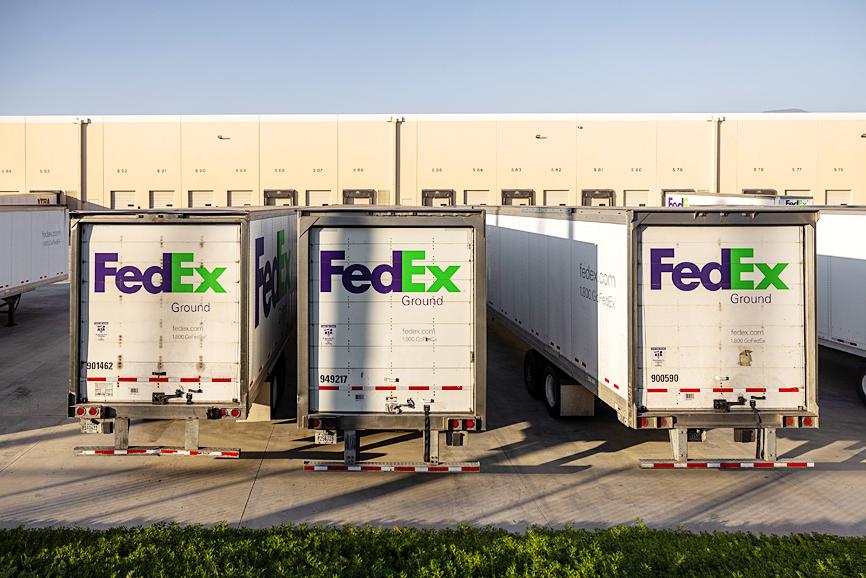FedEx Corp yesterday said that it is to shut its crew base in Hong Kong, the world’s busiest international cargo hub, and relocate its pilots as the territory considers stricter measures on flight crew amid the COVID-19 pandemic.
While the crew base is to close, FedEx is to continue to operate in Hong Kong, because it is a vital part of its Asia-Pacific and global network, the US company said in an e-mailed statement.
The company said that it is providing support for the relocation process of crew members, without providing further details.

Photo: Bloomberg
FedEx’s move comes after Hong Kong Chief Executive Carrie Lam (林鄭月娥) on Tuesday said that authorities would consider tougher rules after three Cathay Pacific Airways Ltd (國泰航空) cargo pilots were confirmed to have COVID-19 after returning from Frankfurt, Germany.
The territory is prioritizing a “COVID-19 zero” policy in a bid to reopen its border with mainland China.
The freight and parcel delivery giant is to continue to serve Hong Kong with pilots based in Oakland, California, the South China Morning Post reported, citing a memo by Robin Sebasco, Fedex’s system chief pilot.
The company at the start of the year relocated 180 pilots and their families from Hong Kong to California in response to aircrew quarantine measures, the newspaper said.
Cathay, the world’s third-biggest airfreight commercial airline, on Monday said that all crew who have flown in from Frankfurt this month are undergoing a 21-day quarantine at a government facility.
Crew members at Cathay are also required to get a third COVID-19 vaccine shot as soon as possible.
The carrier has also reached out to pilots of its Boeing Co 747 aircraft for more volunteers to participate in its so-called closed-loop plan — which requires them to fly non-stop for three weeks before entering a two-week quarantine upon their return — to ensure that services are not disrupted.

HANDOVER POLICY: Approving the probe means that the new US administration of Donald Trump is likely to have the option to impose trade restrictions on China US President Joe Biden’s administration is set to initiate a trade investigation into Chinese semiconductors in the coming days as part of a push to reduce reliance on a technology that US officials believe poses national security risks. The probe could result in tariffs or other measures to restrict imports on older-model semiconductors and the products containing them, including medical devices, vehicles, smartphones and weaponry, people familiar with the matter said. The investigation examining so-called foundational chips could take months to conclude, meaning that any reaction to the findings would be left to the discretion of US president-elect Donald Trump’s incoming team. Biden

INVESTMENT: Jun Seki, chief strategy officer for Hon Hai’s EV arm, and his team are currently in talks in France with Renault, Nissan’s 36 percent shareholder Hon Hai Precision Industry Co (鴻海精密), the iPhone maker known as Foxconn Technology Group (富士康科技集團) internationally, is in talks with Nissan Motor Co’s biggest shareholder Renault SA about its willingness to sell its shares in the Japanese automaker, the Central News Agency (CNA) said, citing people it did not identify. Nissan and fellow Japanese automaker, Honda Motor Co, are exploring a merger that would create a rival to Toyota Motor Corp in Japan and better position the combined company to face competitive challenges around the world, people familiar with the matter said on Wednesday. However, one potential spanner in the works is

SEMICONDUCTORS: Samsung and Texas Instruments would receive US$4.75 billion and US$1.6 billion respectively to build one chip factory in Utah and two in Texas Samsung Electronics Co and Texas Instruments Inc completed final agreements to get billions of US dollars of government support for new semiconductor plants in the US, cementing a major piece of US President Joe Biden administration’s CHIPS and Science Act initiative. Under binding agreements unveiled Friday, Samsung would get as much as US$4.75 billion in funding, while Texas Instruments stands to receive US$1.6 billion — money that would help them build facilities in Texas and Utah. The final deals mean the chipmakers can begin collecting the funding when their projects hit certain benchmarks. Though the terms of Texas Instruments’ final agreement is

Call it an antidote to fast fashion: Japanese jeans hand-dyed with natural indigo and weaved on a clackety vintage loom, then sold at a premium to global denim connoisseurs. Unlike their mass-produced cousins, the tough garments crafted at the small Momotaro Jeans factory in southwest Japan are designed to be worn for decades, and come with a lifetime repair warranty. On site, Yoshiharu Okamoto gently dips cotton strings into a tub of deep blue liquid, which stains his hands and nails as he repeats the process. The cotton is imported from Zimbabwe, but the natural indigo they use is harvested in Japan —